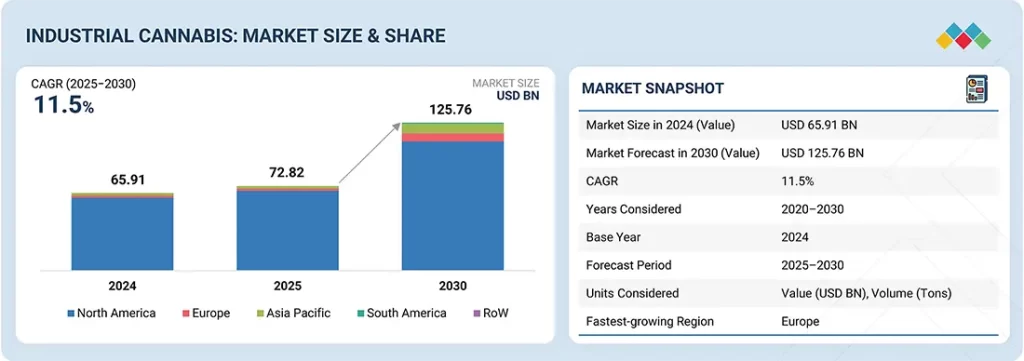The global cannabis market is projected to grow significantly, rising from an estimated USD 72.83 billion in 2025 to USD 125.76 billion by 2030, at a robust CAGR of 11.5% during the forecast period. This growth is fueled by expanding legalization, increasing therapeutic demand, broader consumer acceptance, and rising interest in both medical and recreational cannabis products. Innovations in edibles and vape products are driving greater emphasis on quality control and safety testing. Meanwhile, evolving health trends and clinical research are refining regulations, and heightened scrutiny of product potency and ingredients is raising consumer awareness about safe usage. Enhanced regulatory oversight, expanding markets, and ongoing public discourse around cannabis are further boosting demand for standardized testing and compliance solutions.

Cannabis Market Growth Driver: Increasing cannabis demand for medicinal applications
In the US, medical cannabis is regulated by every state, with more than two-thirds of states, plus the District of Columbia, legalizing it for medical use and more considering licensing for official usage. The Food and Drug Administration has granted approval to cannabis-based treatments to manage rare types of epilepsy, such as Dravet syndrome and Lennox-Gastaut syndrome. Worldwide, there is an ongoing discussion about moral and ethical concerns, but the acceptance of medical cannabis continues to be on the rise. Cannabidiol (CBD), an extract of cannabis with little to no psychoactive properties, is considered to be a safe and effective treatment for insomnia, anxiety, epilepsy, spasticity, chronic pain, and inflammation. Epidiolex, a cannabis product approved by the FDA, is known to reduce seizure frequency and severity significantly. There is international acceptance of a combination product called Sativex containing CBD and THC for spasticity associated with multiple sclerosis. THC-containing medications that are FDA-approved for treating chemotherapy-associated nausea and appetite loss associated with AIDS are dronabinol and nabilone. There is promising evidence that full-spectrum cannabis extract and CBD have therapeutic potential benefits for managing anxiety, pain, inflammation, and symptoms of viral infection, with fewer side effects than other common medications.
For example, in June 2025, Tilray Medical released new pharmacokinetic evidence concerning THC and CBD formulations, along with augmenting its European distribution after the Italian Ministry of Health issued additional approvals. This clearly extends Tilray’s ability to supply quality-controlled therapeutic products. Panaxia Pharmaceutical Industries, of Israel, is establishing a transaction footprint in Europe, having successful tenders to supply its products to distributors in France, Germany, and Cyprus, while simultaneously accelerating clinical trials for the sublingual tablets and metered-dose inhalers for consistent dosing.
Finally, Ananda Pharma is advancing proprietary CBD-based drug candidates to treat chemotherapy-induced neuropathy and inflammatory pain and has moved into Phase II studies required for regulatory approval. On the supply side, Ondara in Spain received cultivation and production licenses in July 2025 from the Spanish Medicines Agency to significantly increase the output of medicinal cannabis in Soria, which reinstated more than 40 jobs and reinforced Europe’s local supply chain. Together, these advances highlight how an expanding therapeutic use or category—with supporting clinical evidence, regulatory approval, and supply chain stores—removes cannabis product barriers as countries and companies innovate to meet higher patient and healthcare demand.
Download PDF Brochure: https://www.marketsandmarkets.com/pdfdownloadNew.asp?id=201768301
Application Insights
The nutraceutical & wellness segment is the fastest-growing application within the cannabis market. These products focus on promoting health, nutrition, and overall wellness without inducing strong psychoactive effects. Typically containing cannabinoids such as CBD and low levels of THC, nutraceutical cannabis products offer therapeutic benefits for managing stress, anxiety, sleep issues, mild inflammation, chronic pain, and skin health. Common product forms include CBD oils, capsules, gummies, topical balms, cannabis-infused beverages, skincare products, and functional edibles.
This shift reflects a move away from purely recreational use toward preventive and wellness-oriented consumption. The trend resonates strongly with health-conscious consumers seeking plant-based, natural alternatives to support wellness without the high associated with THC-rich products.
Compound Type Insights
The CBD-dominant segment holds the second-largest market share within the cannabis industry. CBD, a non-psychoactive compound, supports sleep, pain relief, stress management, and inflammation reduction. It has gained FDA approval for epilepsy treatment and is increasingly recognized for its benefits in wellness, skincare, and sports recovery.
Edibles, especially gummies, are particularly popular due to their convenience and precise dosing. In May 2025, Charlotte’s Web launched Brightside, a line of microdose THC gummies blended with CBD, CBG, and CBC for targeted wellness benefits. Advances in supercritical CO₂ extraction and growing demand for plant-based self-care products continue to drive CBD market expansion.
Request Sample Pages: https://www.marketsandmarkets.com/requestsampleNew.asp?id=201768301
Regional Insights
North America is expected to maintain the largest share of the global cannabis market throughout the forecast period. This dominance is driven by expanding legalization for both medical and recreational use, robust clinical research validating therapeutic benefits, strong consumer acceptance, and ongoing product innovation—particularly in edibles, topicals, and infused beverages.
Rising demand for plant-based wellness solutions and alternatives for chronic pain, anxiety, and sleep disorders further fuels growth. Regulatory frameworks play a crucial role: the U.S. Food and Drug Administration (FDA) oversees cannabis-derived medicines; the Drug Enforcement Administration (DEA) regulates controlled substances; Health Canada manages Canada’s cannabis framework; and state-level boards regulate local medical and recreational markets in the U.S.
Leading Cannabis Manufacturers:
Leading companies profiled in the cannabis market include:
- Canopy Growth Corporation (Canada)
- Curaleaf (U.S.)
- Cresco Labs (U.S.)
- Green Thumb Industries (GTI) (U.S.)
- Tilray Brands (U.S.)
- Aurora Cannabis Inc. (Canada)
- Trulieve (U.S.)
- Medmen (U.S.)
- Blüm Holdings Inc. (U.S.)
- Organigram Global (Canada)
- Terrascend (U.S.)
- Village Farms International Inc. (U.S.)
- Verano (U.S.)
- The Cronos Group (Canada)
- Medical Marijuana, Inc. (U.S.)

